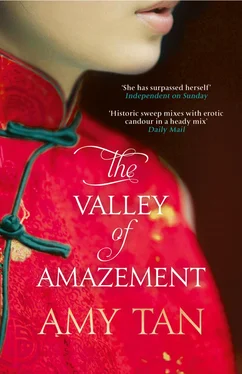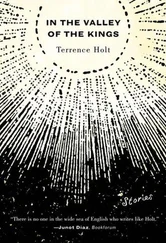I remained troubled by the girl’s accusation. I asked Mother if she had spoken Chinese as a child, and she told me that Golden Dove had given her rigorous lessons. I then asked Mother if I spoke Chinese as well as the courtesans did. “In many ways, yours is better,” she said. “More beautifully spoken.” I was alarmed. I asked my new tutor if a Chinese person naturally spoke Chinese better than an American ever could. He said the shapes of the mouth, tongue, and lips of each race were best suited to its particular language, as were the ears that conducted words into the brain. I asked him why he thought I could speak Chinese. He said that I studied well and had exercised my mouth to such a degree that I could move my tongue differently.
I worried for two days, until logic and deduction enabled me to reclaim my race. First of all, I reasoned, Mother was American. Although my father was dead, it was obvious he had been an American, since I had fair skin, brown hair, and green eyes. I wore Western clothing and regular shoes. I had not had my feet crushed and wedged like dumpling dough into a tiny shoe. I was educated, too, and in difficult subjects, such as history and science—”and for no greater purpose than Knowledge Alone,” my tutor had said. Most Chinese girls learned only how to behave.
What’s more, I did not think like a Chinese person—no kowtowing to statues, no smoky incense, and no ghosts. Mother told me: “Ghosts are superstitions, conjured up by a Chinese person’s own fears. The Chinese are a fearful lot and thus they have many superstitions.” I was not fearful. And I did not do everything a certain way just because that was how it had been done for a thousand years. I had Yankee ingenuity and an independent mind; Mother told me that. It was my idea, for example, to give the servants modern forks to use instead of ancient chopsticks. Mother, however, ordered the servants to return the silverware. She said that each tine was more valuable than what a servant might earn in a year, and thus, the servants might be tempted to sell the forks. The Chinese did not hold the same opinion about honesty as we Americans. I agreed. Now if I were Chinese, would I have said that about myself?
After I left Miss Jewell’s Academy, I forbade the courtesans to call me Vyau-la. They also could no longer use Chinese endearments like “little sister.” They had to call me Vivi, I told them. The only people who could call me Violet were those who could say my name precisely, and they were my mother, Golden Dove, and my tutor.
After I changed my name, I realized I could do so whenever I pleased to suit my mood or purpose. And soon after, I adopted my first nickname as the result of an accident. I had been racing through the main salon and bumped into a servant carrying a tray of tea and snacks, which clattered to the floor. He exclaimed that I was a biaozi, a “little whirlwind.” A delightful word. I was the Whirlwind who blew through the famed house of Hidden Jade Path with my nimbus of fluffy dark hair and my cat chasing the ribbon that had once held my hair in place. From then on, the servants had to call me Whirlwind in English, which they pronounced “woo-woo.”
I loved my golden fox cat. She belonged to me, and I to her, and that was a feeling I had with no other—not even my mother. When I held my kitty, she kneaded her paws on my bodice, snagging the lace and turning it into fishing nets. Her eyes were green like mine, and she had a beautiful golden sheen over her brown-and-black-splotched body. She glowed under moonlight. Mother gave her to me when I told her I wanted a friend. The cat had once belonged to a pirate, she said, who named her Carlotta after the Portuguese king’s daughter he had kidnapped. No one else had a pirate’s cat, whereas anyone could have a friend. A cat would always be loyal, unlike a friend. Mother said she knew that for a fact.
Almost everyone in the house feared my pirate cat. She scratched those who chased her off the furniture. She howled like a ghost when she was stuck inside a wardrobe. If she sensed fear in people who approached her, she bristled and let them know they were right to be scared. Golden Dove froze whenever she saw Carlotta prancing toward her. A wildcat had badly wounded her when she was a little girl, and she had nearly died of green pus fever. If anyone picked up my kitty, she bit, fast and hard, and if anyone petted her without my permission, her claws flew out. She murdered a seventeen-year-old boy named Loyalty Fang, who came to Hidden Jade Path with his father. I had been looking for Carlotta and spotted her under the sofa. A boy was in the way and he started jabbering to me in a language I could not understand. Before I could warn him not to touch Carlotta, he reached down and grabbed her tail, and she dug her claws into his arm and peeled off four bloody ribbons of skin and flesh. He turned white, gritted his teeth, and fainted, mortally wounded. His father took him home, and Golden Dove said he would surely die, and later, one of the courtesans said he had and that it was a pity he had never enjoyed any pleasures of the boudoir. Even though it was the boy’s fault, I was scared that Carlotta would be taken away and drowned.
With me, Carlotta was different. When I carried her in my arms, she was tender and limp. At night, she purred in my arms, and in the morning, she chirped at me. I kept bits of sausage in my apron pocket for her, as well as a green parrot’s feather tied to a string, which I used to lure her out of hiding from under one of the many sofas in the salon. Her paws would poke out of the fringe as she batted at the feather. Together we raced through the maze of furniture, and she vaulted onto tables and chairs, up curtains, and onto the high lips of the wainscoting—to wherever I wanted her to go. That salon was Carlotta’s and my playground, and that playground was in a former ghost villa that my mother had turned into Hidden Jade Path.
On several occasions, I heard her tell Western newspaper reporters how she secured the place for almost nothing. “If you want to make money in Shanghai,” she said, “take advantage of other people’s fear.”
This villa, gentlemen, was originally built four hundred years ago as the summer mansion of Pan Ku Xiang, a rich scholar and a renowned poet, for what lyrical merits no one knows because his inscribed thoughts went up in smoke. The grounds and its original four buildings once stretched over one-half hectares, twice what it is now. The thick stone wall is the original. But the west and east wings had to be rebuilt after they were consumed by a mysterious fire—the same flames that ate the scholar’s poetic thoughts. A legend has been handed down over four hundred years: One of his concubines in the west wing started the fire, and his wife in the east wing died screaming in a circle of flames. Whether it is true, who can say? But any legend is not worth making up if it does not include a murder or two. Don’t you agree?
After the poet died, his eldest son hired the best stonemasons to carve a stele that sat on a tortoise and was crowned by a dragon, symbols of honor reserved for a high official—although there was no record in the county that he had ever been one. By the time his great-grandson was the head of the family, the stele had fallen and was nearly obscured by tall prickly weeds. Weather wore down the scholar’s name and accolades into unreadable indentations. This was not the eternal reverence the scholar had had in mind. When his descendants sold the place a hundred years ago for a cheap price, the curse began. Within a day of receiving the money, his descendant was seized with a firelike pain and died. A thief killed another son. The children of those sons died of one thing or another, and it was not old age. A succession of buyers also suffered from unusual maladies: reversals of fortune, infertility, insanity, and such. When I saw the mansion, it was an abandoned eyesore, the grounds a jungle of choking vines and overgrown bushes, the perfect haven for wild dogs. I bought the property for the price of a Chinese song. Both Westerners and Chinese said I was foolish to take it at any price. No carpenter, stonemason, or coolie would ever step across that haunted threshold.
Читать дальше











